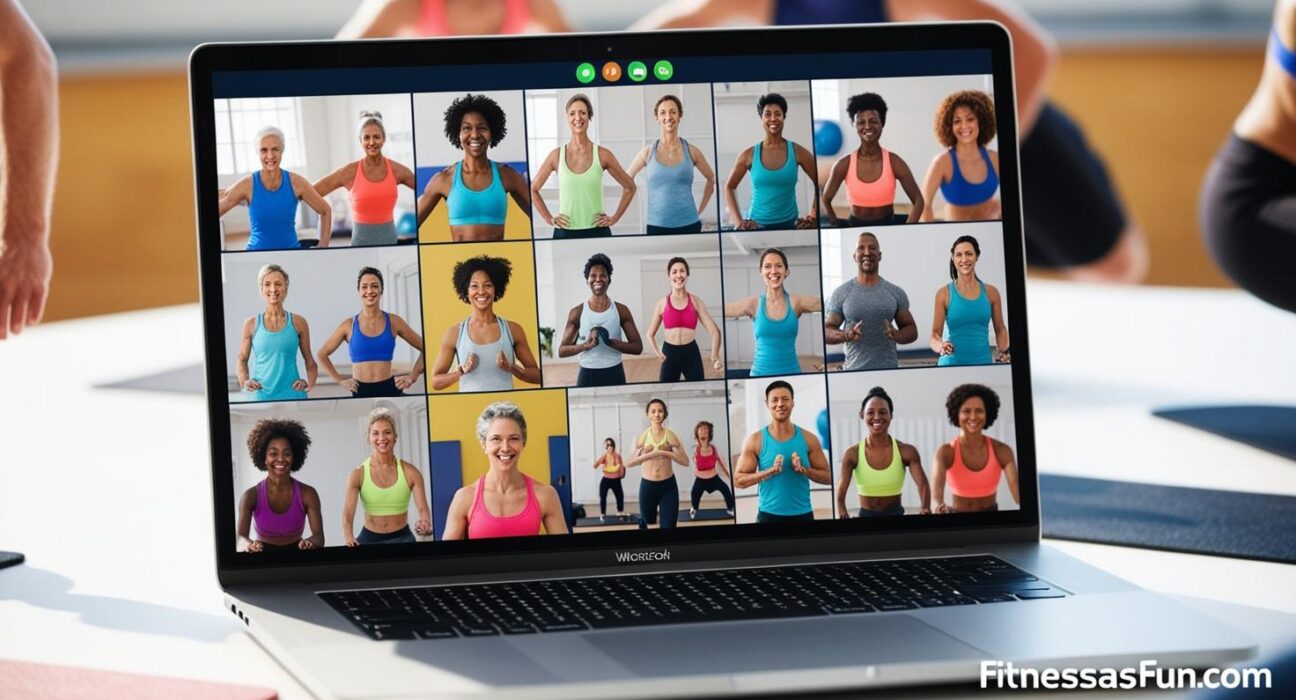I. Why This Shift Matters
Let’s face it—working out alone sucks.
Before 2020, the gym was more than equipment; it was energy. Then everything changed. Lockdowns turned living rooms into fitness zones. What was missing? Community. Accountability. Vibes.
That’s when virtual fitness communities rose—and they didn’t just replace in-person gyms. They redefined what fitness support could look like.
II. What Is a Virtual Fitness Community?

It’s more than a Zoom workout.
A virtual fitness community is a group of people connected online who:
- Follow a common fitness path
- Encourage each other
- Share wins, setbacks, and progress
- Keep each other accountable
It can be a Facebook group, a Discord server, an app-based challenge, or even a WhatsApp accountability pod.
The format doesn’t matter. The connection does.
III. Why It Works: The Psychology Behind It
You’re not lazy. You’re human.
Most people drop fitness goals not from lack of willpower—but from isolation. When you feel seen, supported, and challenged, you stay consistent.
Here’s how virtual communities fix that:
- Social proof: You see others showing up daily. That pulls you in.
- Micro accountability: Skipping a workout? Your group notices.
- Recognition loop: Small wins get celebrated. That builds momentum.
- Accessible mentorship: You can ask questions, get tips, and learn from others—instantly.
IV. Real Impact: My Experience
I joined an online bodyweight challenge last year. Just 30 days, led by a coach on Telegram.
At first, I thought, “It’s just a group chat.”
But here’s what happened:
- I didn’t skip a single day. Others were sharing sweaty selfies—I couldn’t be the slacker.
- When I plateaued, someone else in the group gave me a regression that helped.
- On day 30, we had a virtual high-five session. I felt proud. Not just of me—of us.
It wasn’t about workouts. It was about belonging.
V. Top Virtual Fitness Communities Worth Exploring

1. FitOn App Community
- Offers free workouts with a built-in social feed.
- You can invite friends, track together, and post progress.
2. Nike Training Club
- High production workouts, expert guidance, and community discussion inside the app.
3. Reddit Fitness Communities
- Subreddits like r/bodyweightfitness or r/fitness are goldmines for tips, plans, and progress threads.
4. Peloton Digital
- Not just bikes—tons of strength, yoga, and HIIT classes with live leaderboards.
5. Private Discord/WhatsApp Pods
- Small, focused, and intimate. Great for daily accountability if you create or join the right group.
VI. How to Get the Most Out of One

Joining is step one. Engaging is where the magic happens.
- Post your progress—even small wins
- Ask for help when stuck. Someone else probably faced the same problem.
- Cheer others on. You get what you give.
- Stay visible. Lurking doesn’t build bonds.
The more connected you are, the more consistent you become.
VII. Final Thought: Fitness Is No Longer a Solo Game

If you’ve struggled to stay on track, it’s not just about discipline. You might just be missing your people.
Virtual fitness communities remove geography, judgment, and gym anxiety. They give you a tribe. And when you’re in the right tribe, staying fit feels less like a grind—and more like a journey worth showing up for.
FAQs
Q: Can I build my own virtual fitness community?
A: Yes—start small. Use WhatsApp, Telegram, or Discord. Add a few motivated friends and commit to daily check-ins.
Q: Are paid communities better than free ones?
A: Not always. Paid options offer structure, but free groups can be just as powerful if the culture is right.
Q: What if I’m shy or introverted?
A: Start by reacting to others’ posts or asking simple questions. Engagement grows with comfort.
Q: Do these communities help with weight loss?
A: Indirectly—yes. They support habit formation, which leads to consistency, which leads to results.
Q: Is this a replacement for real-life gym friends?
A: Not always—but it’s a powerful complement. And for many, it’s the only realistic option.
Sources:
- Stanford Behavioral Science Lab: Research on group accountability and behavior change
- Pew Research: Digital Community Trends 2024
- FitOn and Peloton platform data (2023 user engagement metrics)






